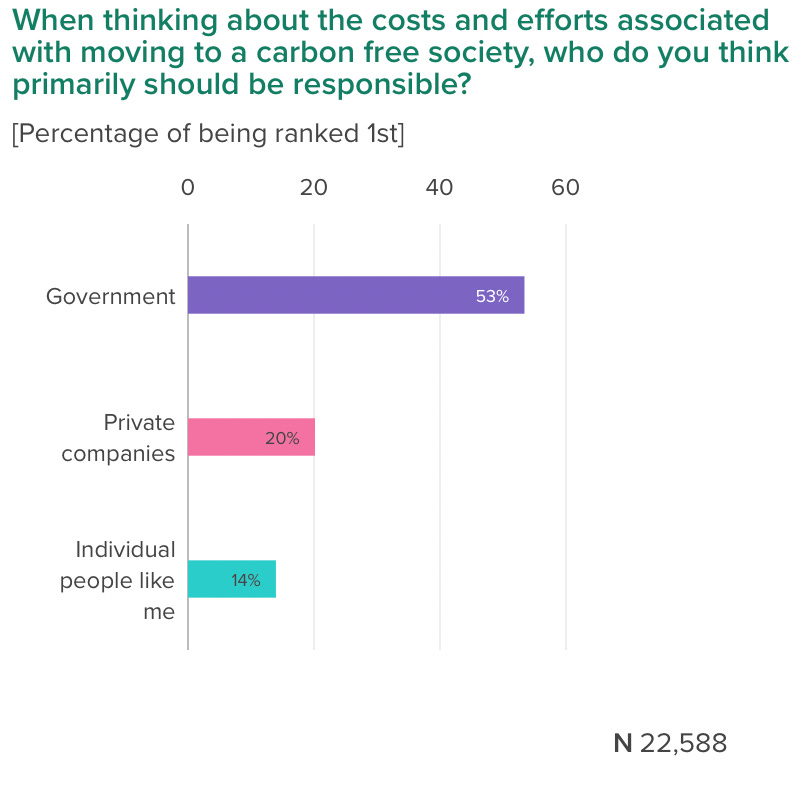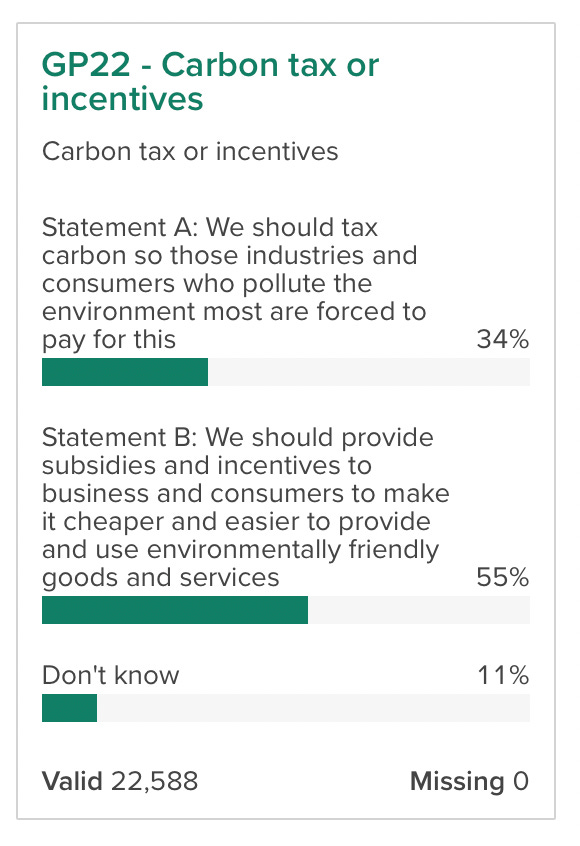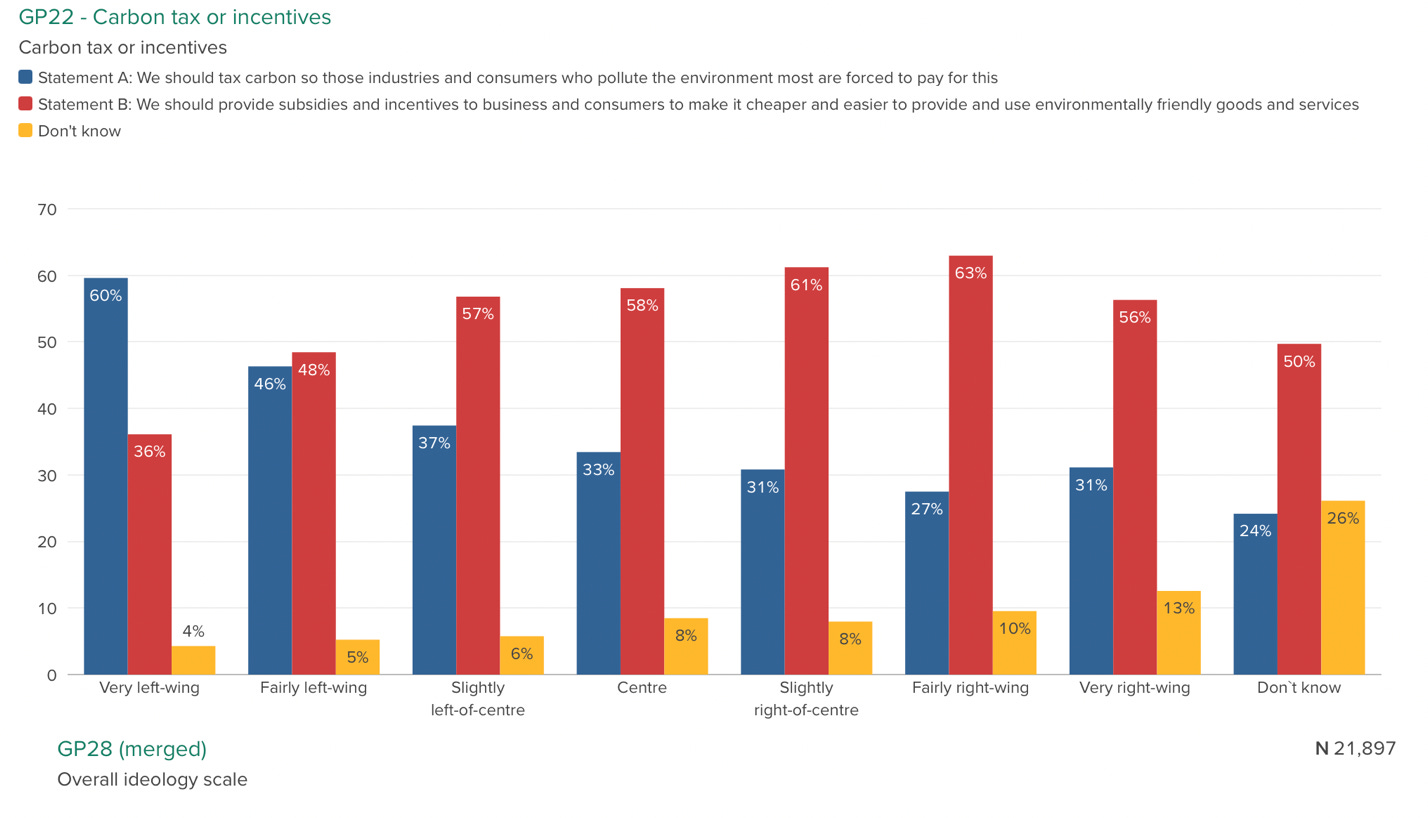Clean Energy Carrots > Carbon Tax Sticks
Citizens across 20 countries favor government subsidies and incentives for clean energy over carbon taxes.
Despite increasingly dire predictions of planetary demise and apocalyptic rhetoric about the climate crisis, citizens across 20 leading democracies overwhelmingly favor carrots over sticks when it comes to addressing global warming.
This finding is based on TLP’s ongoing examination of vital multinational survey data conducted with more than 22,000 respondents globally by YouGov and Global Progress ahead of the G20 summit in Rome and the COP26 climate negotiations in Glasgow.
To start, it’s important to note that most people across the globe are unwilling individually to take on the costs of transitioning to cleaner energy use.
As seen in the chart below, citizens across all 20 countries overwhelmingly believe that it is the responsibility of government first and foremost—not private companies or individuals—to bear the costs and shoulder the burdens of moving to a carbon free society. Fifty-three percent of respondents overall rank “government” first on the list of responsibility, with “private companies” (20 percent) and “individual people like me” (14 percent) falling much lower in terms of perceptions of who should take the lead in going carbon free.
Given that most people around the world are averse to doing anything themselves, how do citizens want their governments to make the transition to a carbon free society?
Essentially through more subsidies and incentives for clean energy use rather than through taxes or punishment for carbon pollution. The survey presented respondents with two statements and asked them which one comes closest to their own view, even if they don’t fully agree with either one:
We should tax carbon so those industries and consumers who pollute the environment most are forced to pay for this.
(or)
We should provide subsidies and incentives to business and consumers to make it cheaper and easier to provide and use environmentally friendly goods and services.
By a 55 percent to 34 percent margin overall, citizens across these 20 countries prefer subsidies and incentives for environmentally friendly goods and services over carbon taxes for polluters. As seen below, only those citizens globally who describe their political ideology as “very left wing” choose carbon taxation as their preferred approach to global warming. Pluralities or majorities of all other ideological groups from “fairly left wing” to “very right wing” favor clean energy subsidies and incentives when forced to choose.
Looking comparatively, we find that pluralities or majorities of citizens across 19 of the 20 countries tested (with the exception of India) prefer clean energy subsidies over carbon taxes, as do people across all educational and generational lines.
In political terms, we also find that voters across all major party lines in countries such as Spain, Germany, the U.K., and Italy choose clean energy subsidies over carbon taxes. However, in the United States and Canada, pluralities of both Joe Biden and the Liberal Party voters, respectively, choose carbon taxation as their preferred approach by small margins. Interestingly, Green Party voters appear somewhat split globally. For example, Green voters in countries like Canada and Germany favor subsidies and incentives over carbon taxes, while Green voters in Australia and the U.S. choose carbon taxation.
The political implications of these findings are clear.
If societies want to make progress on reducing global temperatures, the only path forward with real consensus support is for governments to take on the primary task of moving to a carbon-free society by making clean energy cheaper and encouraging businesses and individuals to make the transition through subsidies and incentives—not punishments.
Along with the promise of creating more jobs and businesses in the clean energy sector, the political goal of moving to a carbon-free society clearly needs to be pitched using clean energy carrots over carbon tax sticks. It’s difficult to see any other viable political strategy for moving beyond existing ideological divides over climate change.








